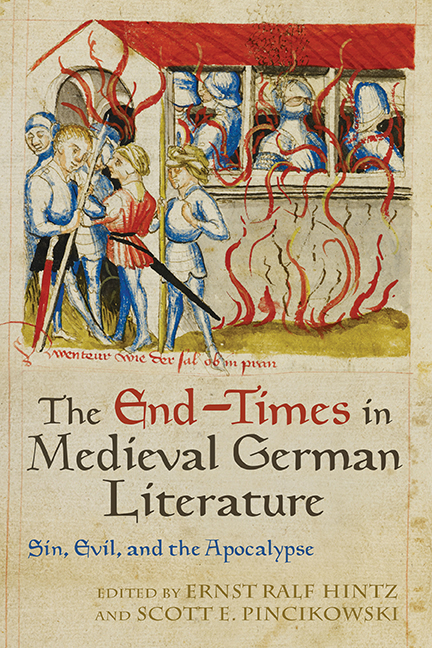Book contents
- Frontmatter
- Dedication
- Contents
- Acknowledgments
- Introduction
- 1 Thiu wirsa giburd: Cain’s Legacy, Original Sin, and the End of the World in the Old Saxon Genesis
- 2 The Heliand Revisited: Spiritual Transgendering and the Defiance of Evil
- 3 The Beginning of the End: Binary Dynamics and Initiative in Hartmann von Aue’s Gregorius
- 4 Poetic Reflections in Medieval German Literature on Tragic Conflicts, Massive Death, and Armageddon
- 5 Beyond Good and Evil: Apocalyptic Vision without Judgment in the Nibelungenlied. An Essay
- 6 End-Times in the Hall: The Modern Reception of the Apocalyptic Ending of the Nibelungenlied
- 7 Past Present, Future Present? Visualizing Arthurian Romance and the Beholder’s Share in a World That Refuses to End
- 8 Ich diene und wirbe / biz ich gar verdirbe: Lovesickness, Apocalypse, and the End-Times in Mauritius von Craûn and Das Nibelungenlied
- 9 The Slippery Concept of Evil in Hartmann von Aue’s Erec and Iwein
- 10 Wigamur’s Lessons on the Complexity of Evil
- 11 The Miracles of the Antichrist
- 12 Monsters and Monstrosities in the Pamphlet Wars of the Reformation
- Notes on the Contributors
- Index
12 - Monsters and Monstrosities in the Pamphlet Wars of the Reformation
Published online by Cambridge University Press: 21 March 2020
- Frontmatter
- Dedication
- Contents
- Acknowledgments
- Introduction
- 1 Thiu wirsa giburd: Cain’s Legacy, Original Sin, and the End of the World in the Old Saxon Genesis
- 2 The Heliand Revisited: Spiritual Transgendering and the Defiance of Evil
- 3 The Beginning of the End: Binary Dynamics and Initiative in Hartmann von Aue’s Gregorius
- 4 Poetic Reflections in Medieval German Literature on Tragic Conflicts, Massive Death, and Armageddon
- 5 Beyond Good and Evil: Apocalyptic Vision without Judgment in the Nibelungenlied. An Essay
- 6 End-Times in the Hall: The Modern Reception of the Apocalyptic Ending of the Nibelungenlied
- 7 Past Present, Future Present? Visualizing Arthurian Romance and the Beholder’s Share in a World That Refuses to End
- 8 Ich diene und wirbe / biz ich gar verdirbe: Lovesickness, Apocalypse, and the End-Times in Mauritius von Craûn and Das Nibelungenlied
- 9 The Slippery Concept of Evil in Hartmann von Aue’s Erec and Iwein
- 10 Wigamur’s Lessons on the Complexity of Evil
- 11 The Miracles of the Antichrist
- 12 Monsters and Monstrosities in the Pamphlet Wars of the Reformation
- Notes on the Contributors
- Index
Summary
IN A WELL-KNOWN SCENCE in Goethe's drama Torquato Tasso (act 2, scene 1), Tasso is put in his place by Princess Leonore von Este, the duke's sister. To his impetuous words “Erlaubt ist, was gefällt” (994; Anything is permissible as long as it pleases), she coolly replies, “Erlaubt ist, was sich ziemt” (1006; Anything is permissible as long as it is proper). As one might expect with Goethe, the dilemma is to be seen not only in relation to the “disproportion between talent and life,” as Caroline Herder put it in a letter to her husband in March 1789 (Goethes Werke, 442); it is also an anthropological constant. Goethe has the poet Tasso speak of a golden era (979), a time of universal freedom (981) when nature is unfettered by custom and morality, which he claims is the freedom of poetry and thus of the artist himself. The princess, by contrast, points to rules of social life and of that which is seemly (1017), not only in the sense of courtly “etiquette” but with regard to human sociability, which is fundamental to humanity. To mark this contradistinction, Uwe Japp in 2007 used the terms “reguläre Verfasstheit” (generic constitution) und “Sonderkompetenz” (exceptional competence). We know, of course, how this conflict ends in the play: with the princess's ardent, unseemly embrace by Tasso; with her horror-stricken, ambiguous exclamation “Hinweg!” (3284; Away!); with the fear (expressed by the duke) that Tasso might be “von Sinnen” (3285; out of his mind); and with the poet's subjection to the “tyranny” of convention. In Weimar, Goethe himself smarted under this contradiction and constraint, and no doubt this was one reason for his escape to Italy. His return to Weimar, however, and the fact that he subsequently continued to work there for several decades, were made possible only by keeping the two principles in balance. Henceforth he combined art and administration, imagination and reality—he bore social responsibility and yet remained a free spirit.
Satirists, too, claim exceptional competence, and in the Germanspeaking world Kurt Tucholsky's famous dictum “Was darf die Satire?
- Type
- Chapter
- Information
- The End-Times in Medieval German LiteratureSin, Evil, and the Apocalypse, pp. 255 - 278Publisher: Boydell & BrewerPrint publication year: 2019

